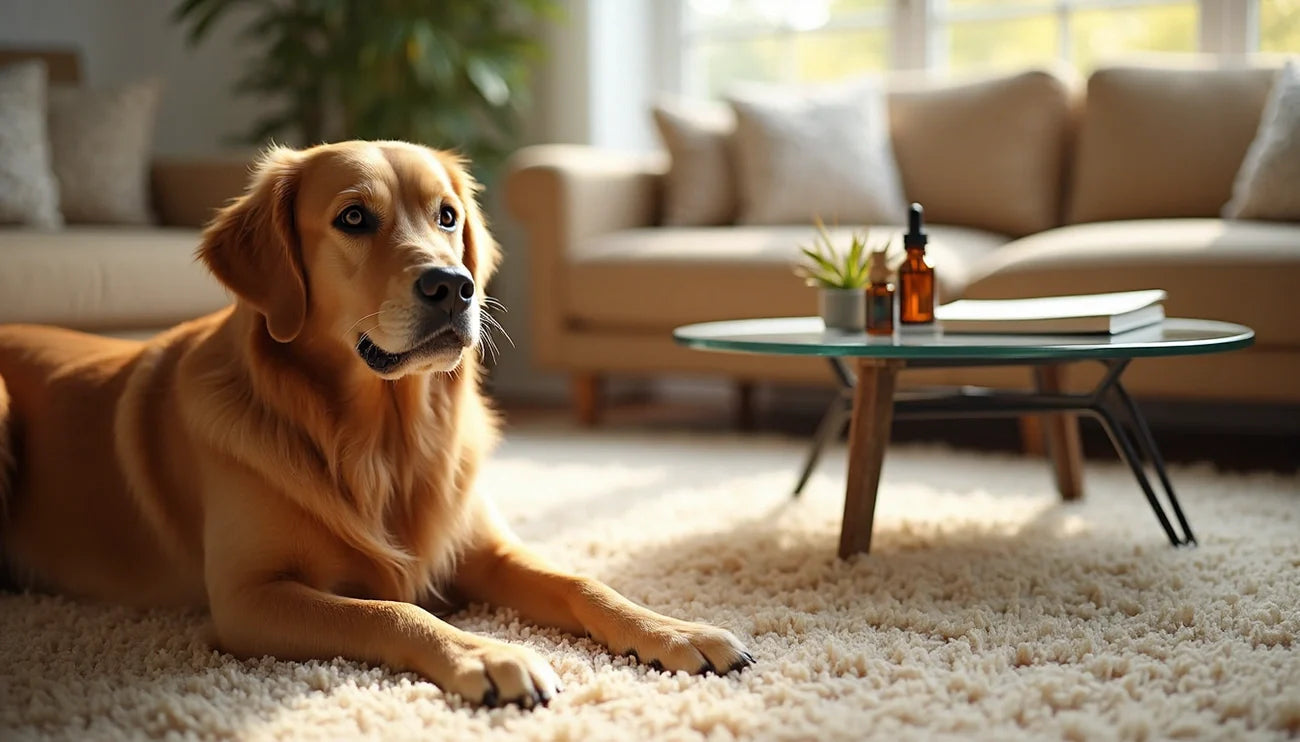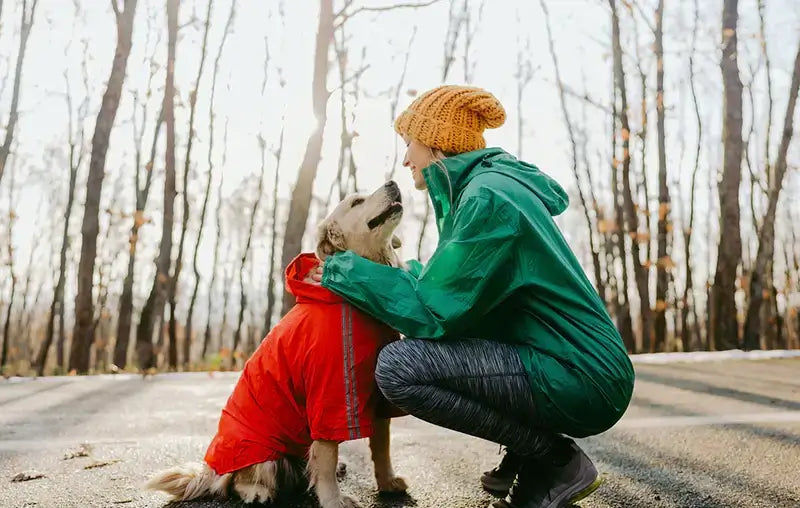
Whether it’s a loud noise from fireworks, or you are wondering how to keep your dog calm during a thunderstorm there are a wide range of factors that can put your pup on edge. Just like humans, it’s normal for dogs to experience stress and a sense of nervousness — some more so than others.
If your dog struggles with frequent stress, it can be debilitating, making it difficult to leave your dog alone or bring them with you.
Naturally, you might wonder how to calm a nervous dog?
The goal isn’t to completely eliminate fear-inducing factors, but rather, to successfully and gradually expose your dog to such things to help him stay calm.
Today, we’ll discuss the signs and symptoms of nervousness and a few techniques to soothe your dog and how to calm your dog down even in stressful situations.
What Causes Doggy Nerves?
For most dogs, nerves are caused by environmental factors and can be treated accordingly According to the Merck Veterinary Manual: “There are common elements to the treatment of fear, stress, phobias and most types of aggression. The first step in the treatment program is to identify each stimulus or interaction in which the problem might arise, so that a preventive program can first be implemented.”
In other words, certain calming practices will work for certain stimuli whereas others will fall flat.
It’s essential that you understand the common causes of your dog’s nervousness and then identify their specific triggers. The goal isn’t to completely eliminate fear-inducing factors, but rather, to successfully and gradually expose your dog to such things to help him stay calm.
Common triggers typically range between situational and behavioral nervousness:
- Environmental changes – Some dogs are creatures of habit. They don’t adapt to changes in their environment, especially sudden changes, whether it's a weather event or a new home.
- Fear-related – Depending on the dog, certain stimuli may trigger your dog’s fear response. The most common fear-related issues are loud noises such as fireworks, but there are other elements that may cause concern as well, such as a stranger, a surface, a vacuum cleaner or someone with an umbrella.
- Separation stress – Most pet owners have to leave their pet alone for parts of the day. We understand that. Some dogs don’t. According to the American Kennel Club, approximately 14% of dogs suffer from separation stress. Those that do are “unable to find comfort when they are left alone or separated from their family members. This stress often manifests itself in undesirable behaviors, such as urinating and defecating in the house, destroying furniture and furnishings and barking.”
- Travel phobias – While some dogs love nothing more than to stick their head out of the window during a car ride, others loathe being transported. Travel stress can occur for dogs in any vehicle—be it a car, plane, train or boat.
- Age-related stress – Like people, when dogs age their minds start to falter. Sometimes this is known as cognitive dysfunction syndrome (CDS). For dogs, CDS can negatively impact their memory, perception and awareness. This can lead to confusion, which causes stress and fear.
Symptoms of a Nervous Dog
So, how do you know your dog has a case of the nerves?
Don’t worry, they’ll let you know.
Even though dogs can’t communicate verbally, their behavioral changes will clearly signal that something is wrong. It’s important that you learn to read your dog’s body language. Understanding when they’re uncomfortable can help you avoid or prepare for potential situations that might trigger a fear response.
One reason you need to be extra careful is that the most common manifestation of doggy nerves is aggression. According to the AKC, that aggression can be channeled in one of two ways:
Direct aggression occurs when a dog acts aggressively toward people or other animals. Indirect aggression can be equally dangerous, and often happens when a person comes between the dog and the source of the dog’s aggression, such as another dog. Even if a dog is prevented from harming others, aggressive behaviors such as growling or barking can lead to undesirable situations for humans and dogs, alike.
Aside from that, common behavioral symptoms include:
- lowered appetite
- depression
- destructive behavior
- drooling
- excessive barking
- hypervigilance
- pacing
- panting
- repetitive or compulsive behaviors
- restlessness
- shaking
- urinating or defecating in the house
How to Help a Nervous Dog
If you notice a habitual issue with doggy nerves, it would be wise to first take your pup to see the vet. The vet can tell you how to help a nervous dog by identifying the root causes, or determining whether the stress is situational or the result of underlying medical issues. From there, you can strategize the best ways to combat the issue.
That said, generally speaking, there are a few ways you can address common triggers:
Remove Triggers
In some cases, the best option is to simply remove common stressors. In doing so, you can begin to identify the root causes of doggy nerves. If they’re less stressed out since you cut out an environment or activity, that could be a sign of a trigger.
For instance, if your pup doesn’t do well with a lot of noise and activity, it may be better to take them on walks when fewer people are outside or to visit less populous areas.
By adding or removing potential triggers and then observing your dog’s behavior, you can begin to identify the underlying causes. Armed with that knowledge, you can then begin addressing those issues via counterconditioning.
Counterconditioning
In the vast majority of cases, the most important step you can take is to focus on shifting your dog’s emotional response to stress-inducing stimuli.
How? Via counterconditioning.
With counterconditioning, you replace undesirable responses (such as those mentioned above) with healthy responses. This is typically done by using reinforcement-based techniques, also known as response substitutions.
The process starts by focusing on preventing or minimizing arousal, since arousal triggers a dog’s autonomic fight-or-flight response.
By slowly introducing sources of stress — preferably in baby steps — you can desensitize your pup to such issues. Repeated exposure combined with rewarding good behavior can help condition your pup to respond in healthier ways.
Note: While owners can perform counterconditioning on their own, it’s helpful to enlist the expertise of a dog trainer so that you don’t accidentally reinforce bad habits or just make things worse.
Exercise and a Healthy Diet
A dog’s automatic fear and stress responses are quite similar to that of humans. As a result, many of the stress relieving techniques we use will have similar effects on pups. In this case, a healthy diet and regular exercise can help your dog release pent up energy and aggression. By wearing your pup out with regular play, they will be more relaxed and less likely to have an intense response to environmental triggers.
Doggy CBD
Cannabidiol (CBD) is one of 100+ unique chemical compounds known as cannabinoids found in the hemp-plant. When ingested, it has beneficial properties to both humans and dogs alike. According to Dr. Jerry Klein of AKC:
"Currently, there has been no formal study on how CBD affects dogs. What scientists do know is that cannabinoids interact with the endocannabinoid receptors located in the central and peripheral nervous systems, which help maintain balance in the body and keep it in a normal healthy state."
But is CBD safe for dogs?
As of now, the popular medical consensus is yes. According to a recent PubMed safety assessment trial, researchers discovered that, “In healthy dogs and cats, an oral CBD-rich hemp supplement administered every 12 [hours] was not detrimental based on CBC or biochemistry values.”
It’s also important that the CBD oil has no detectable THC, the primary psychoactive cannabinoid found in marijuana.
Fighting stress is just one of many reasons why pet owners give their pup CBD. Others include:
- Easing aches and discomfort
- Supporting a deep and restful sleep
- Lessening tension
- Supporting healthy digestion
But you shouldn’t simply give your dog any type of CBD. It’s important to only give them canine-formulated CBD, which is designed for their diet and bodily systems, thus ensuring there won’t be any negative side effects.
Enter Zebra CBD.
Zebra CBD — Precisely Formulated Canine CBD
When your dog is stressed, it can have negative impacts on their health and happiness. Fortunately, there are techniques and natural remedies that can help mitigate this common issue.
When it comes to canine CBD, Zebra CBD leads the pack. We recently announced a new line of dog-centric, premium, hemp-based CBD calming chews for dogs, oils and balms. Each one is designed with your pup’s health and happiness at the forefront.
Want to calm your nervous dog? So do we.
At Zebra CBD, all of our products are third-party lab tested (by two independent labs) and arrive with a Zebra CBD Label Accuracy Guarantee™. So, when you give your dog Zebra CBD, you know they’re getting the highest quality ingredients.
Source:
Merck Manual Veterinary Medicine. Behavioral Problems of Dogs. https://www.merckvetmanual.com/behavior/normal-social-behavior-and-behavioral-problems-of-domestic-animals/behavioral-problems-of-dogs
American Kennel Club. CBD Oil for Dogs: What You Need to Know. https://www.akc.org/expert-advice/health/cbd-oil-dogs/










